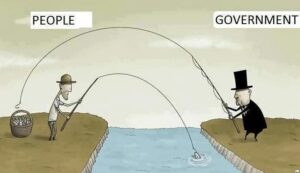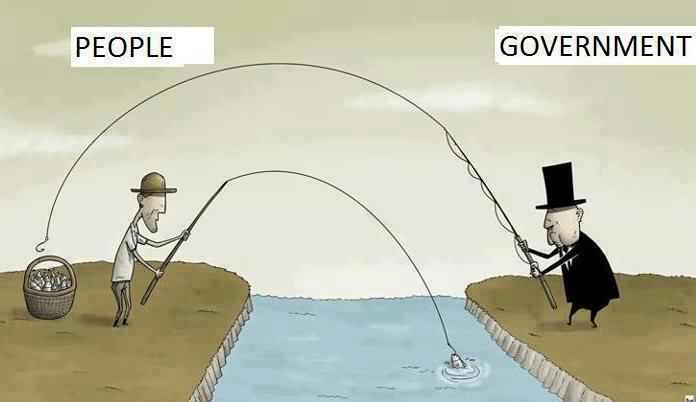
At this point is the US’s devolution into oblivion? It seems trite to cite the Constitution – in any context.
Well, in our now-permanent, all-consuming squall? We grasp for anything that may still float.
When the ship of state is taking on so much water – from so many holes? The best thing to do is find the best ways to impede the most water.
In today’s hemorrhagic context – one of those ways may be: Invoicing the federal government for its infinite overreaches.
Translation: If The Feds are going to screw you? They should compensate you for the costs of their screwing you.
The Fifth Amendment of the Constitution – establishes said stipulation. Behold: The Takings Clause:
“(N)or shall private property be taken for public use, without just compensation.”
If The Feds are regulating you or your stuff – they are in essence nationalizing you or your stuff for public use. In kicks the Takings Clause.
Every regulation causes private sector harm – and costs the private sector money:
“Anytime government does anything, it costs We the People money – in (at least) two directions.
“At the front end – because before government can do anything it must take from us the coin to do it.
“And at the back end – because anything the government makes us do costs us more coin.
“What wise man Mark Steyn calls complying with the Department of Compliance.”
Any such government action – should be subjected to The Takings Clause. And the private sector victim – should be compensated by their public sector overlords.
Since none of the government’s money – is actually the government’s money? It all is first taken from us?
The way to best impose the compensation requirement on an agency – is to take it off the top of the following year’s agency budget. If your agency cost private citizens $10 billion in 2023? Your agency gets $10 billion less from Congress in 2024.
Since that would zero-out many agency budgets? Our idea may work better than most of us could even hope.
One MONSTROUS example of government Takings abuse – is the Waters of the United States (WOTUS) enviro-idiocy.
EPA WOTUS Rule will Crush Property Rights and Cost Billions
Here’s What to Know About WOTUS:
“If you’re a landowner, developer, or farmer, regulations around WOTUS put restrictions on what you can and cannot do with certain bodies of water on your property.
“It also gives the federal government the final say in any environmental decisions concerning those bodies.”
What Went Wrong With WOTUS: Reflections on Economic Valuation and Environmental Regulation:
“(T)he WOTUS rule exemplifies a growing distrust of experts in Washington, D.C., who put forth far-reaching regulatory proposals that have widely dispersed benefits but whose costs are concentrated and borne by identifiable people.”
Those “identifiable people” – who bear those concentrated costs? Should be compensated by the bureaucrats imposing them.
A second example? Idiotic government price controls – where the government mandates prices below actual market prices? They would have to pay to make up those differences.
Another class of victims? People who secure patents at the Patent and Trademark Office (USPTO).
The application process ain’t easy – and it ain’t cheap:
“The USPTO is ‘unique among federal agencies because it operates solely on fees collected by its users, and not on taxpayer dollars’ Its ‘operating structure is like a business in that it receives requests for services—applications for patents and trademark registrations—and charges fees projected to cover the cost of performing the services [it] provide[s].’…
“Patent examiners make up the bulk of the employees at USPTO. They hold degrees in various scientific disciplines, but do not necessarily hold law degrees. Unlike patent examiners, trademark examiners must be licensed attorneys.
“All examiners work under a strict, ‘count’-based production system. For every application, ‘counts’ are earned by composing, filing, and mailing a first office action on the merits, and upon disposal of an application.”
So the USPTO self-funds – thereby technically end-running our Congressional budgetary punishment proposal. But if they have to come up with the Takings Clause compensation coin themselves? That’s a de facto budgetary punishment – if not a de jure one.
Patent applicants are paying the USPTO – to have its self-selected experts make the patent determinations. If the USPTO then awards you a patent – that should be the end of it.
Except it’s not. Because in 2011, DC ratified the exceedingly awful America Invents Act (AIA).
How the America Invents Act Harmed Inventors
Created by the AIA – was the exceedingly awful Patent Trail and Appeal Board (PTAB). Which rendered the USPTO a hypocrisy machine. It issues patents – and then it takes them away:
“DC has reverse-engineered the government entity responsible for issuing patents – to now destroy patents.
“Patents that government entity its own self had issued – are now destroyed by that same government entity.
“This is insane. This is the USPTO saying ‘Congratulations, you have a patent.’ And then saying ‘Psyche. We were just kidding.’
“But not until after you took them and the patent they gave you at their word. And done what the Little Guys mentioned above did – spent even more time and money to start businesses and hire people.
“And then the government comes back and yanks the rug – they themselves weaved – out from under you.”
Oh: Defending your USPTO-issued patents – at the USPTO PTAB – ain’t cheap:
“PTAB challenges are very expensive, often topping 1M+ USD through Federal Circuit appeal. “They add 2-4 years to most district court suits. Proceedings can be remanded to the PTAB by the Federal Circuit, causing additional delay.”
And the patent thieves – have institutionalized and industrialized the patent theft:
“Multiple proceedings can be filed against the patent by a petitioner. In addition, any third party can file a petition without a jurisdictional requirement.
“Serial filings by one petitioner and/or parallel filings by multiple petitioners are not uncommon, particularly involving a financially significant patent or a patent being asserted against more than one accused infringer.
“Joint defense groups are often formed in the later circumstance to coordinate the PTAB strategy against the common patent.
“Against this backdrop, companies like Unified Patents were formed to aggregate the PTAB opportunity and threat of accused infringers.
“For a subscription fee, these enterprises launch PTAB proceedings against many asserted patents, particularly where the patent is being asserted against more than one accused infringer.
“These PTAB aggregators offer several benefits to accused infringers, including reduced PTAB cost, no estoppels, and the ability to circumvent the one-year challenge requirement. They act as a surrogate for the accused infringer, who never files a PTAB challenge.
“All of this is known by experienced PTAB attorneys and their clients.”
ALL of this nonsense? Is geared to getting the USPTO to invalidate patents. That the patent owners paid the USPTO to examine and validate. Which the USPTO then did.
If the USPTO then invalidates that patent? That’s on the USPTO – not the people to whom they issued the patent.
Those patent holders – should be compensated by the USPTO. For ALL the exorbitant expenses of defending the patent. And the initial costs incurred to apply for and receive the patent.
Whether or not the patent is eventually invalidated. The defense costs are incurred regardless – and should be reimbursed regardless.
If the federal government’s VERY many bureaucracies had to pay for their VERY many idiocies?
Perhaps – PERHAPS – they would engage in fewer idiocies.

